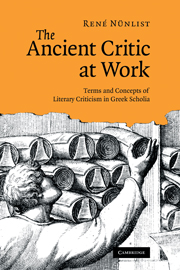Book contents
- Frontmatter
- Contents
- Acknowledgments
- Introduction
- PART I
- 1 Plot
- 2 Time
- 3 Narrative and speech
- 4 Focalisation
- 5 Effects on the reader
- 6 Gaps and omissions
- 7 Poetic licence
- 8 Authentication
- 9 Style
- 10 Allusions, hints, hidden meanings
- 11 Characters
- 12 Mythography
- PART II
- Epilogue
- Glossary of Greek terms
- Editions of scholia
- Other abbreviations
- Bibliography
- Thematic index
- Index locorum
6 - Gaps and omissions
Published online by Cambridge University Press: 29 August 2009
- Frontmatter
- Contents
- Acknowledgments
- Introduction
- PART I
- 1 Plot
- 2 Time
- 3 Narrative and speech
- 4 Focalisation
- 5 Effects on the reader
- 6 Gaps and omissions
- 7 Poetic licence
- 8 Authentication
- 9 Style
- 10 Allusions, hints, hidden meanings
- 11 Characters
- 12 Mythography
- PART II
- Epilogue
- Glossary of Greek terms
- Editions of scholia
- Other abbreviations
- Bibliography
- Thematic index
- Index locorum
Summary
It is a well-established fact that no text is a seamless series of pieces of information which provide the reader with an entirely complete picture. Instead, every text contains minor or major gaps which the reader is to fill in for himself or herself on the basis of the surrounding information that the text does provide. In the case of minor gaps, the reader hardly notices them at all. Other gaps, however, may be considered more serious and may therefore encourage a commentator to give an explanation that something is presupposed, but never explicitly mentioned, in the text. As a consequence, the scholia repeatedly report that a particular event happened κατὰ τὸ σιωπώμενον (‘in silence, tacitly’ ≈ ‘implicitly’). For instance, in Il. 5.221–8 Aeneas invites Pandarus to mount his chariot in order for them to attack the raging Diomedes. They do so in 239–40. What happened to the charioteer?
εἴη δ᾿ ἂν ὁ τοῦ Αἰνείου ἡνίοχος κατὰ τὸ σιωπώμενον καταβεβηκώς, καὶ ἔστι παρʾ ʿΟμήρῳ πολλὰ τοιαῦτα.
(schol. A Il. 5.231b Did.)Aeneas' charioteer must have dismounted tacitly, and there are many instances of such a technique with Homer.
The passage may in itself seem unspectacular, and the interpretation of the scene perhaps somewhat literal-minded. What is important, however, is that κατὰ τὸ σιωπώμενον is recognised as a recurrent feature of Homeric poetry (καὶ ἔστι παρ᾿ ῾Ομήρῳ πολλὰ τοιαῦτα) at an early stage in ancient scholarship.
- Type
- Chapter
- Information
- The Ancient Critic at WorkTerms and Concepts of Literary Criticism in Greek Scholia, pp. 157 - 173Publisher: Cambridge University PressPrint publication year: 2009



